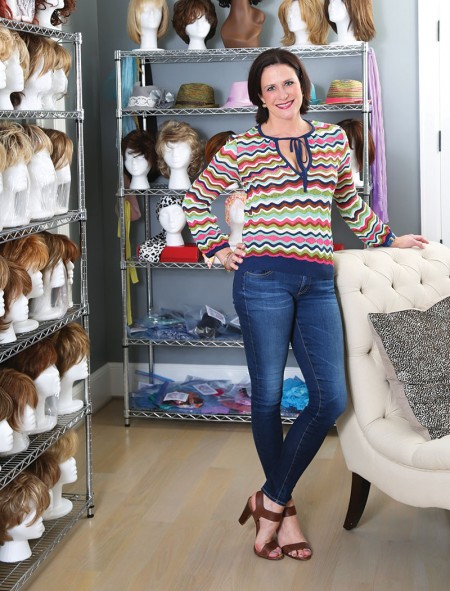A Good Hair Day
Pairing patients with donated wigs


WIGGING OUT Louise Kinnersley (at right) and Nancy Riviere are cancer survivors. Louise donated her wigs to Nancy’s non-profit Wig Out, which gives wigs to patients. (Photo: lawellphoto.com)
Louise Kinnersley will always remember the moment Beckie Hebert got her wig. She had driven her friend to the Afton Oaks home of Nancy Riviere, and the two women had gone into the “Wig Room” while Kinnersley waited.
Hebert had cancer, which Kinnersley also had battled, and she marveled at the sounds of giggling emanating from the room. Slowly, the door opened and Hebert appeared, transformed. “When Beckie walked towards me with the new wig, she looked so happy,” recalls Kinnersley. “Even though she was going through this hard battle, she was happy.”
That feeling is what Riviere aims bring to cancer patients who are struggling with the loss of their hair. The founder of Wig Out, a non-profit group started in 2016 that pairs people with wigs, was diagnosed herself with breast cancer at 39 and again at 42 and endured hair loss from chemotherapy treatment. Today, at 45, Riviere has a mission to give a free wig to every patient who needs one.
It was during chemotherapy at MD Anderson Cancer Center that Riviere realized not every patient had easy access to wigs. “Bald is beautiful, and I get that. I rocked it too sometimes,” says Riviere, whose own dark brown hair has grown back, almost shoulder length. “But having a wig is something very powerful to have. When you wear a wig, you can assimilate and you are not being stared at in public. You are not the ‘sick person’ that day. When you lose your hair, it is a constant reminder that you are ill. And when you wear a wig, you are framing your face again. Having that reflection look back at you and be one that you recognize is a really powerful thing.”

SITTING PRETTY Beckie Hebert, right, celebrated the holidays with friend Ricardo Sotto not long after receiving her wig from Wig Out. “He knew I had been fighting cancer and the first thing he said to me was that I looked fabulous,” says Hebert.
Kinnersley, who battled ovarian cancer a decade ago, relied on her three wigs so much during the time she lost her hair, she nicknamed her wigs “The Girls.” “The wig really is your identity,” says Kinnersley, a marketing consultant. “The wig is creating a foundation for you.”
Once she no longer needed the wigs, Kinnersley wanted to donate them to another person undergoing treatment. An internet search led her to Wig Out, and her connection with Riviere was immediate. “I delivered my wigs and then asked what I could do to help her,” says Kinnersley. “Nancy said: ‘I have got 30 wigs here that need washing.’ So, I took them home and I put 10 at a time in my huge bathtub and began washing. When I was styling them and cleaning them, I was thinking about who the wigs are for and thinking about what they will do for that person.”
Riviere says the emotional and financial toll of cancer treatment can be overwhelming, and she realized that getting people wigs would be a stress off their shoulders. “There is such an enormous fear for those facing chemo,” she says. “Eight percent of women refuse treatment because of the fear of hair loss.” Riviere began reaching out to friends and family and anyone who would listen to her call for help; she needed wig donations to make her dream work. The donations arrived in droves.
Today, her “Wig Room” houses more than 300 donated wigs, and she will ship a wig anywhere in the country to anyone who needs one. “Clients send me photos of what they looked like before they lost their hair,” says Riviere, who considers herself an expert in what she calls ‘wigology.’ “Wigs are crazy expensive, and I try and send a wig that looks most like the person’s natural hairstyle.”

Nancy Riviere, founder of a non-profit that pairs patients with wigs, stands in her “Wig Room,” which is full of donations. (Photo: lawellphoto.com)
Plans to take the wigs on the road are in the works. Wig Out on Wheels, a mobile truck that will take the wigs to chemotherapy centers around Houston, will be rolling out in 2018. “It will be a mobile unit that will go out into the community,” she says. “People will be able to contact us and send photos and then we will meet them at their treatment center.”
“When you are going through chemo, your self esteem is not No. 1 despite how tough you are,” says Hebert, now in remission from stage 3 non-Hodgkin lymphoma.
“It is a really wonderful feeling to have the wig. It totally changes your look. Even people who have known you say: ‘I just love your hair.’”
Editor’s note: Contact Nancy Riviere at wigout.org or 832-706-0888 to make a financial donation or donate quality wigs.
Want more buzz like this? Sign up for our Morning Buzz emails.
To leave a comment, please log in or create an account with The Buzz Magazines, Disqus, Facebook, or Twitter. Or you may post as a guest.


